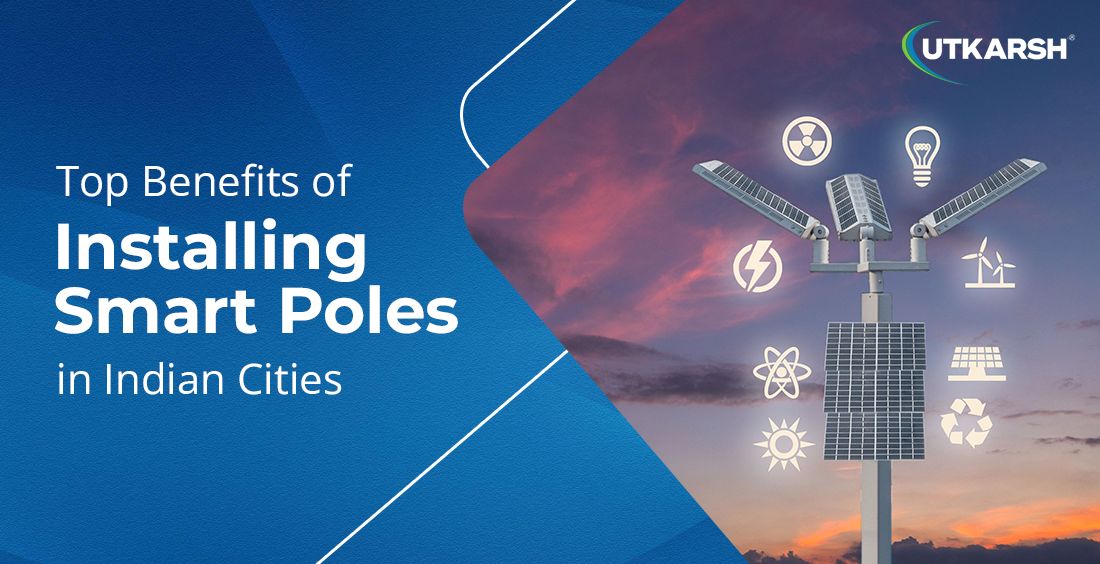Top Benefits of Installing Smart Poles in Indian Cities

As Indian cities continue to modernise and embrace digital technologies, integrating smart infrastructure has become an essential part of urban planning. One of the most interesting developments in this space is the installation of smart poles. Smart poles are multifunctional structures—they can feature energy-efficient LED lighting, surveillance cameras, public Wi-Fi, environmental sensors, and electric vehicle (EV) charging points. They bring a host of benefits that make them perfect for cities aiming to enhance urban living, improve safety, and promote sustainability. Let’s dive into the top benefits of installing smart poles in India:
Energy efficiency and cost savings
One of the greatest advantages of smart poles is their ability to significantly cut down on energy consumption. Traditional streetlights often rely on high-pressure sodium or metal halide lamps, which use a lot of electricity. In contrast, smart poles feature energy-efficient LED lighting, which consumes much less power while providing even better illumination.
Also, many smart poles are equipped with motion sensors that adjust the brightness based on activity levels, optimising energy use further. This reduction in energy consumption doesn’t just benefit the environment; it also results in substantial cost savings for city governments.
Enhancing public safety
Smart poles in India play a key role in enhancing public safety by integrating security features. Many of these poles are fitted with high-definition surveillance cameras, allowing authorities to monitor public spaces in real time. This not only helps deter criminal activities but also enables law enforcement to respond quickly to incidents when they do occur. Many smart poles also include emergency buttons that let citizens contact authorities directly in case of emergencies, adding an extra layer of safety.
Boosting connectivity
Smart poles help bridge the connectivity gap by offering public Wi-Fi services, keeping citizens connected even while on the move. This feature is particularly beneficial in cities where digital infrastructure is still catching up. By providing free or affordable internet access, smart poles help reduce the digital divide, ensuring everyone—regardless of their background—can access the internet.
Environmental monitoring
Smart poles do more than just light up streets and boost connectivity; they also help monitor the environment. Equipped with sensors, these poles can track air quality, temperature, humidity, and noise levels. This data is invaluable for city planners and environmental agencies, as it helps them keep tabs on pollution levels and make informed decisions to improve urban health.
Supporting electric vehicles
Another exciting feature of smart poles is their ability to support electric vehicle adoption. Many smart poles come with EV charging points, making it easier for electric vehicle owners to find convenient charging stations while on the go. As India continues to push towards a more sustainable transportation network, having widespread EV charging infrastructure is key to encouraging more people to switch to electric vehicles.
Looking for information on reliable galvanised pole manufacturers in India?
Explore our high mast lighting systems. Our approved production capacity reaches 3,00,000 units of polygonal poles and 12,000 high masts annually, making us a market leader in this sector. Our state-of-the-art manufacturing facility is ISO 9001, ISO 14001, and ISO 45001 certified, and we have over 15 years of rich experience in manufacturing high mast and polygonal poles. With in-house design, R&D, and testing capabilities for raw materials, in-process checks, and finished products, we ensure our products meet the latest IS specifications. We conduct periodic type testing, wind tunnel tests by IIT Kanpur (2022), and structural stability tests by CSIR SERC Chennai (2022). Our designs are vetted by Jadavpur University, ensuring their stability and reliability.
As a trusted supplier of smart poles, we offer innovative and versatile smart poles. They can support a variety of utilities, such as lights, cameras, public address systems, traffic signals, and provisions for cables, internet, TV connections, and power supply. Our poles start at 3 metres and can be customised to meet specific customer and site needs.